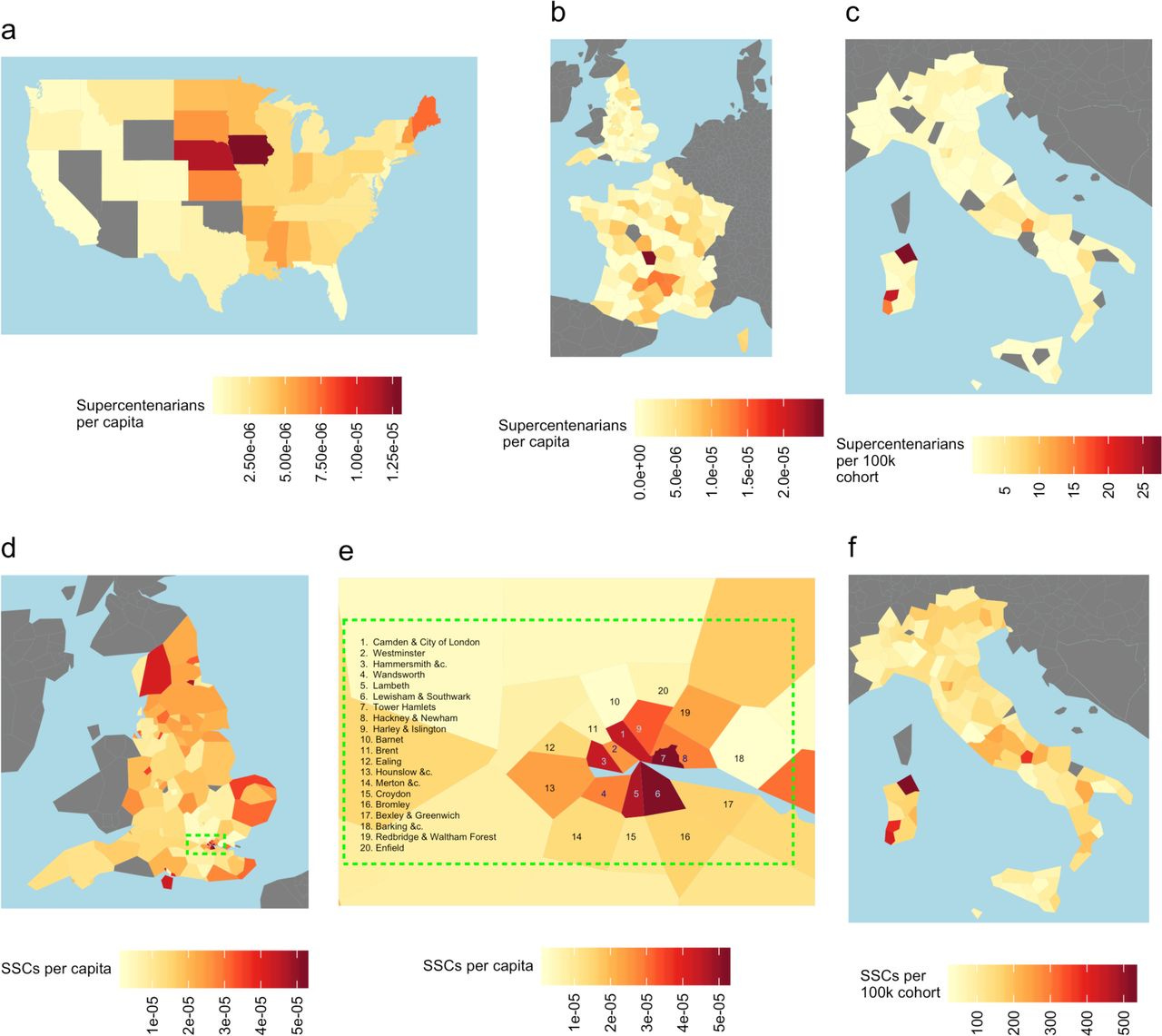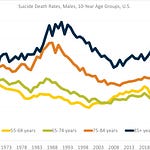A jokey prize ceremony has some serious points — Saul Justin Newman’s research on places with supposedly large numbers of supercentenarians won a 2024 Ig Nobel Prize for demography. I’ve covered his work before, in 2019 and this very year.
Episode Links
Ig Nobel Prizes
DEMOGRAPHY PRIZE [AUSTRALIA, UK]
Saul Justin Newman, for detective work to discover that many of the people famous for having the longest lives lived in places that had lousy birth-and-death recordkeeping.
REFERENCE: “Supercentenarians and the Oldest-Old Are Concentrated into Regions with No Birth Certificates and Short Lifespans,” Saul Justin Newman, BioRxiv, 704080, 2019. <doi.org/10.1101/704080>
REFERENCE: “Supercentenarian and Remarkable Age Records Exhibit Patterns Indicative of Clerical Errors and Pension Fraud,” Saul Justin Newman, BioRxiv, 2024. <doi.org/10.1101/704080>
WHO CAME TO THE CEREMONY: Saul Justin Newman
2024 Paper: Supercentenarian and remarkable age records exhibit patterns indicative of clerical errors and pension fraud
Abstract
The observation of individuals attaining remarkable ages, and their concentration into geographic sub-regions or ‘blue zones’, has generated considerable scientific interest. Proposed drivers of remarkable longevity include high vegetable intake, strong social connections, and genetic markers. Here, we reveal new predictors of remarkable longevity and ‘supercentenarian’ status. In the United States, supercentenarian status is predicted by the absence of vital registration. The state-specific introduction of birth certificates is associated with a 69-82% fall in the number of supercentenarian records. In Italy, England, and France, which have more uniform vital registration, remarkable longevity is instead predicted by poverty, low per capita incomes, shorter life expectancy, higher crime rates, worse health, higher deprivation, fewer 90+ year olds, and residence in remote, overseas, and colonial territories. In England and France, higher old-age poverty rates alone predict more than half of the regional variation in attaining a remarkable age. Only 18% of ‘exhaustively’ validated supercentenarians have a birth certificate, falling to zero percent in the USA, and supercentenarian birthdates are concentrated on days divisible by five: a pattern indicative of widespread fraud and error. Finally, the designated ‘blue zones’ of Sardinia, Okinawa, and Ikaria corresponded to regions with low incomes, low literacy, high crime rate and short life expectancy relative to their national average. As such, relative poverty and short lifespan constitute unexpected predictors of centenarian and supercentenarian status and support a primary role of fraud and error in generating remarkable human age records.
The Conversation: ‘The data on extreme human ageing is rotten from the inside out’ – Ig Nobel winner Saul Justin Newman
But your work is actually incredibly serious?
I started getting interested in this topic when I debunked a couple of papers in Nature and Science about extreme ageing in the 2010s. In general, the claims about how long people are living mostly don’t stack up. I’ve tracked down 80% of the people aged over 110 in the world (the other 20% are from countries you can’t meaningfully analyse). Of those, almost none have a birth certificate. In the US there are over 500 of these people; seven have a birth certificate. Even worse, only about 10% have a death certificate.
The epitome of this is blue zones, which are regions where people supposedly reach age 100 at a remarkable rate. For almost 20 years, they have been marketed to the public. They’re the subject of tons of scientific work, a popular Netflix documentary, tons of cookbooks about things like the Mediterranean diet, and so on.
Okinawa in Japan is one of these zones. There was a Japanese government review in 2010, which found that 82% of the people aged over 100 in Japan turned out to be dead. The secret to living to 110 was, don’t register your death.
The Japanese government has run one of the largest nutritional surveys in the world, dating back to 1975. From then until now, Okinawa has had the worst health in Japan. They’ve eaten the least vegetables; they’ve been extremely heavy drinkers.
What about other places?
The same goes for all the other blue zones. Eurostat keeps track of life expectancy in Sardinia, the Italian blue zone, and Ikaria in Greece. When the agency first started keeping records in 1990, Sardinia had the 51st highest old-age life expectancy in Europe out of 128 regions, and Ikaria was 109th. It’s amazing the cognitive dissonance going on. With the Greeks, by my estimates at least 72% of centenarians were dead, missing or essentially pension-fraud cases.
….
What’s your best guess about true human longevity?
Longevity is very likely tied to wealth. Rich people do lots of exercise, have low stress and eat well. I just put out a preprint analysing the last 72 years of UN data on mortality. The places consistently reaching 100 at the highest rates according to the UN are Thailand, Malawi, Western Sahara (which doesn’t have a government) and Puerto Rico, where birth certificates were cancelled completely as a legal document in 2010 because they were so full of pension fraud. This data is just rotten from the inside out.
MedRXiV: The global pattern of centenarians highlights deep problems in demography
Posted 6 Sept 2024
Abstract
Accurate age data is fundamental to medicine, social sciences, epidemiology, and good government. However, recent and heavily disputed debates on data quality have raised questions on the accuracy of demographic data at older ages. Here, we catalogue late-life survival patterns of every country in the world from 1970-2021 using comprehensive estimates of old-age populations provided by global governments and curated by the United Nations. Analysis of 236 nations or states across 51 years reveals that late-life survival data is dominated by anomalies at all scales and in all time periods. Life expectancy at age 100 and late-life survival from ages 80 to 100+, which we term centenarian attainment rate, is highest in a seemingly random assortment of states. The top 10 ‘blue zone’ regions with the best survival to ages 100+ routinely includes Thailand, Kenya and Malawi – respectively now 212th and 202nd in the world for life expectancy, the non-self-governing territory of Western Sahara, and Puerto Rico where birth certificates are so unreliable they were recently declared invalid as a legal document. These anomalous rankings are conserved across long time periods and multiple non-overlapping cohorts, and do not seem to be sampling effects. Instead these patterns suggest a persistent inability, even for nation-states or global organisations, to detect or measure error rates in human age data, with troubling implications for epidemiology, demography, and medicine.
Puerto Rico Birth Certificates Law 191 of 2009 Fact Sheet
In December 2009, the government of Puerto Rico enacted a new law (Law 191 of 2009) aimed at strengthening the issuance and usage of birth certificates to combat fraud and protect the identity and credit of all U.S. citizens born in Puerto Rico. The new law was based on collaboration with the U.S. Department of State (DOS) and the U.S. Department of Homeland Security (DHS) to address the fraudulent use of Puerto Rico-issued birth certificates to unlawfully obtain U.S. passports, Social Security benefits, and other federal services.
In the past, many common official and unofficial transactions in Puerto Rico unnecessarily required the submission, retention, and storage of birth certificates. As a result, hundreds of thousands of original birth certificates were stored without adequate protection, making them easy targets for theft. Subsequently, many birth certificates have been stolen from schools and other institutions, sold on the black market for prices up to $10,000 each, and used to illegally obtain passports, licenses, and other government and private sector documentation and benefits.
As a result of this growing problem, approximately 40 percent of the passport fraud cases investigated by the DOS Diplomatic Security Services in recent years involved birth certificates of people born in Puerto Rico. This left Puerto Rico-born U.S. citizens vulnerable to identity theft, ruined credit, stolen Social Security benefits, and increased “random” security checks at airports, among others.
Understanding the enormous risks to all individuals as well as the very significant homeland and national security concerns, the government of Puerto Rico took action to improve the security of all birth certificates and to better protect the public from fraud and identity theft.
Pension Fraud Stories
DiNapoli: New York City Man Charged with Stealing Over $50,000 in Pension Benefits Meant for Deceased Sister-in-Law
September 16, 2024
A 69-year-old Manhattan man, Randy Ray, was arrested today for allegedly stealing more than $50,000 in pension benefits meant for his deceased sister-in-law, New York State Comptroller Thomas P. DiNapoli announced.
“Randy Ray allegedly took advantage of his sister-in-law's death to fund his lifestyle,” DiNapoli said. “I will continue to safeguard the pension system and partner with law enforcement across the state and country to prosecute those who attempt to defraud it. I thank Albany County District Attorney David Soares and the New York State Police for their partnership in bringing Ray to justice.”
The pensioner, Ray’s sister-in-law, retired on disability retirement in October 1986 from the Supreme Court, Appellate Division, where she served as a confidential legal stenographer. She retired choosing the state retirement system’s single life allowance option, meaning at the time of her death in January 2019 her monthly pension payments of $1,341.78 should have ended. Instead, the retirement system was not informed of and did not learn about her death until July 2022. Once the system discovered her death, payments were stopped, and an investigation launched.
A forensic analysis was completed on the bank account where the pension payments were being deposited, which was a joint account in the name of the pensioner and Ray. The investigation found that Ray diverted over $50,000 in pension payments made after his sister-in-law’s death and used the money to pay credit card bills, travel, and make online purchases.
Ray was arraigned on a charge of grand larceny in Albany County Court. He is due back in court on October 30.
NY Post, 2012: Mama’s boy jailed: son gets up to 41 years in ‘Psycho’ fraud
He’s not going to the Bates Motel.
A “Psycho” scammer who dressed up as his dead mom so he could collect her Social Security benefits will instead be checking into state prison for 13 2/3 to 41 years after being sentenced yesterday for the bizarre Norman Bates-like stunt.
Thomas Prusik-Parkin, 52 was convicted this month of grand larceny and mortgage fraud for posing as Irene Prusik for several years in order to pocket more than $44,000 of the dead woman’s benefits.
“It’s amazing — it’s amazing!” Justice Vincent Del Giudice said as he sentenced the frail, bearded man. “It borders on ludicrous that you expected to get away with this.”
Prusik-Parkin’s actress mom, Irene, was 73 when she died in 2003. Within days of Prusik’s death, authorities charged, her son changed her Social Security numbers and doctored other documents.
The admitted Norman Bates admirer’s kooky cross-dressing caper fell apart in 2009 when he donned the matronly getup to tell Brooklyn prosecutors he was being ripped off by a man who bought out of foreclosure the $2.2 million Park Slope building deeded to him by his mom.
Del Giudice shook his head as he recalled how the elderly “woman” claimed she had cataracts when an investigator from the Brooklyn DA’s Office asked why the lights in her apartment were dimmed.
Jurors in the trial were shown a video of Prusik-Parkin in a platinum woman’s wig, sunglasses and a dress during a visit to a Department of Motor Vehicles office.
“It just boggles the mind that you continued this plan of deceit by impersonating her and committing a fraud at the DMV,” Del Giudice said.
Prusik-Parkin, maintained that it wasn’t him in the videos.
During a rambling statement before he was sentenced, Prusik-Parkin insisted he hadn’t rejected a deal from prosecutors that could have sprung him from jail, rather than face up to 41 years in prison.
The Sentinel Effect, Centenarians, and Pension Fraud
I cover how some people live to a grand old age — by lying about it! And why do they do that? For the money, of course! The sentinel effect, though, can prevent this from occurring. Looking at the case of the oldest man in Japan who had been dead for 30 years and more.
Japan Pension Fraud
July 2010, BBC News: Tokyo's 'oldest man' had been dead for 30 years
He was thought to be the oldest man in Tokyo - but when officials went to congratulate Sogen Kato on his 111th birthday, they uncovered mummified skeletal remains lying in his bed.
Mr Kato may have been dead for 30 years according to Japanese authorities.
They grew suspicious when they went to honour Mr Kato at his address in Adachi ward, but his granddaughter told them he "doesn't want to see anybody".
Police are now investigating the family on possible fraud charges.
Wikipedia: Sogen Kato, Aftermath
After the discovery of Kato's mummified corpse, other checks into elderly centenarians across Japan produced reports of missing centenarians and faulty recordkeeping. Tokyo officials attempted to find the oldest woman in the city, 113-year-old Fusa Furuya, who was registered as living with her daughter. Furuya's daughter said she had not seen her mother for over 25 years.[12] The revelations about the disappearance of Furuya and the death of Kato prompted a nationwide investigation, which concluded that police did not know if 234,354 people older than 100 were still alive.[13] More than 77,000 of these people, officials said, would have been older than 120 years old if they were still alive. Poor record keeping was blamed for many of the cases,[13] and officials said that many may have died during World War II. One register claimed a man was still alive at age 186.[14]
Following the revelations about Kato and Furuya, analysts investigated why recordkeeping by Japanese authorities was poor. Many seniors have, it has been reported, moved away from their family homes. Statistics show that divorce is becoming increasingly common among the elderly. Dementia, which afflicts more than two million Japanese, is also a contributing factor. "Many of those gone missing are men who left their hometowns to look for work in Japan's big cities during the country's pre-1990s boom years. Many of them worked obsessively long hours and never built a social network in their new homes. Others found less economic success than they'd hoped. Ashamed of that failure, they didn't feel they could return home,"[13] a Canadian newspaper reported several months after the discovery of Kato's body.[13]
August 2019: Mortality with Meep: How to Get Lots of Supercentenarians? Pension fraud!
December 2019: Can the Government Tell If You're Dead or Alive?

















Share this post